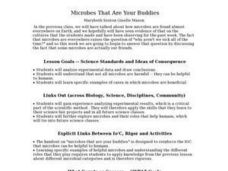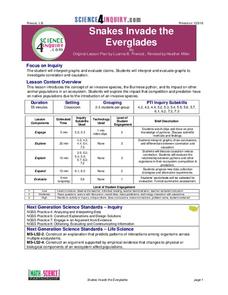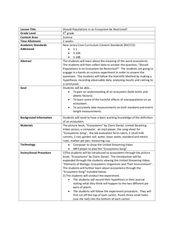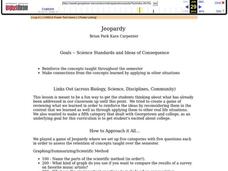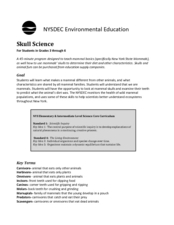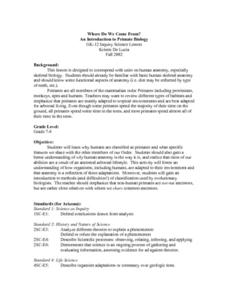Curated OER
Microbes That Are Your Buddies - Biology Teaching Thesis
Learners analyze experimental data and draw conclusions. They are able to comprehend that not all microbes are harmful--they can be helpful to humans. Students are able to comprehend specific examples of cases in which microbes are...
Curated OER
Adventures in Earth Day: Why Do We Care About Our Environment? - Biology Teaching Thesis
Students are introduced to Earth Day and the importance of this day. They make a collage, students can use articles, pictures, words, etc., in magazines or newspapers or online, that relate to Earth Day, the environment and environmental...
Science 4 Inquiry
Snakes in the Everglades
The Burmese python is on the loose ... and he's hungry! Illustrate the differences between causative and correlative relationships through an inquiry instructional activity. Pupils examine several sources of information to determine if...
Curated OER
"Publication" of Scientific Papers And Posters
Students create and display a scientific poster in the same format that scientists use at a research symposium. They compile data and make conclusions about the classification of the Arizona Hedgehog Cactus as an endangered species. ...
Curated OER
Sharks in Decline
Students investigate common fishing methods used to capture sharks. They decide why these methods and the shark's reproductive biology are contributing to the quick reduction in the shark population.
Curated OER
Primary Biological Content Area Covered
Young scholars use the scientific method to make predictions about mold growth. In this fungus lesson plan, students use worksheets to help them illustrate predictions and graph mold growth from white to wheat bread. Young scholars first...
Curated OER
Every Breath You Take
Learners study acids and bases and the uses of indicators. They interpret the actions of an indicator to conclude that bromothymol blue turns yellow in the presence of a weak acid.
Curated OER
Cancer and the Cell Cycle - Biology Teaching Thesis
Identify the different stages of mitosis and what occurs in each stage with a straightforward biology lesson. Young scientists identify the importance of the cell cycle control in maintaining homeostasis, and then match the correct...
Curated OER
Protect the Skin You're in
Students explore the importance of sun safety in relationship to skin cancer prevention. They test the effectiveness of various sunscreens and administer and analyze a simple survey to their peers. In addition, they implement a public...
Curated OER
Should Populations in an Ecosystem be Restricted?
Fourth graders experiment to determine how overpopulation effects ecosystems specifically plants. In this ecosystem instructional activity, 4th graders conduct an ecosystems experiment after listening to Claire Daniel's, Ecosystems. They...
Curated OER
Science Lesson Plans
Students conduct a variety of exploration activities on various science topics. In this science lesson outline, students design a cell encapsulation to hold a specific type of medicine. They give examples of physical and chemical...
Curated OER
Biology In Elementary Schools
Students classify animals into six major animal groups and describe the characteristics of the animals found within each group. In this living and non-living animals lesson, students observe a variety of animals, both living and...
Curated OER
Does Dye Die? Foreign Chemicals in Our Environment
Learners conduct an experiment to observe photolysis in the lab. In this chemistry lesson, students explain the mechanism behind photolysis. They test the impact of a non-toxic marker to plant metabolism.
Curated OER
Jeopardy
Students played a game of Jeopardy where there was five categories with five questions each in order to assess the retention of concepts taught over the semester. The categories included: Graphing/Summarizing/ Scientific Method, Gravity,...
Curated OER
Skull Science
What can your class learn from a skull? With proper facilitation, they can learn about diet, physical adaptations, special differences, and even the environment. Pupils will examine a series of mammal skulls and pelts to help them...
Curated OER
Drinking Water and Water Purification
Sixth graders design experiments to compare the amount of bacteria in river water to the amount in purified tap water. They explore how water purification removes bacteria and pollution from the water. Students examine the steps of the...
Curated OER
Using a Controlled Experiment to Identify Two Unknown Plasmids
Student demonstrate knowledge of recombinant DNA techniques (restriction enzyme digest, gel electrophoresis, and staining gel). They demonstrate skills needed to complete a gel electrophoresis and interpret a stained gel. Pupils solve...
Curated OER
Improving Literacy in the Biology Classroom via Genetic Disorders
Students read, write and reflect on Science articles, this approach will promote both literacy and critical thinking skills. Critical thinking skills learned in the science classroom from these activities will impact students in many...
Curated OER
Where Do We Come From? An Introduction to Primate Biology
Seventh graders explore skeletal biology. Through a discussion and video observation, 7th graders investigate how the anatomy is adapted to the environment. Students study primates and explore their characteristics and behaviors.
Curated OER
Observation Milk Fat Lesson
Turn your class loose to experiment with the different fat content in skim milk, whole milk, half and half, and heavy cream. This is a visually vibrant experiment, as learners drip food coloring on the surface of the products and measure...
Curated OER
Biology: Understanding Cellular Organelles
Students distinguish the differences between Prokaryotic and Eukaryotic cells. Using microscopes, they examine a variety of plant and animal cells. Working in groups, they draw and label plant and animal cells and show the mathematical...
Curated OER
Communication in Bees
Eighth graders identify and interpret a scientific investigation and a hypothesis through experimentation and testing a hypothesis. They identify what scientists hypothesized about the communication of stingless bees. Finally, 8th...
Curated OER
Mutualism and Co-evolution A study of Flowering Plants and their Pollinators: Biology, Plants
These lessons use a variety of methods and approaches to teach flowering plant biology which includes seed germination; plant growth and food production through photosynthesis; plant transpiration and respiration; sexual reproduction...
Curated OER
Positive Futures Fair - Application of Year-Long Content Skills
Students demonstrate the knowledge of proper scientific investigation and reporting skills. They decide how to make a positive difference in the world using these skills.
